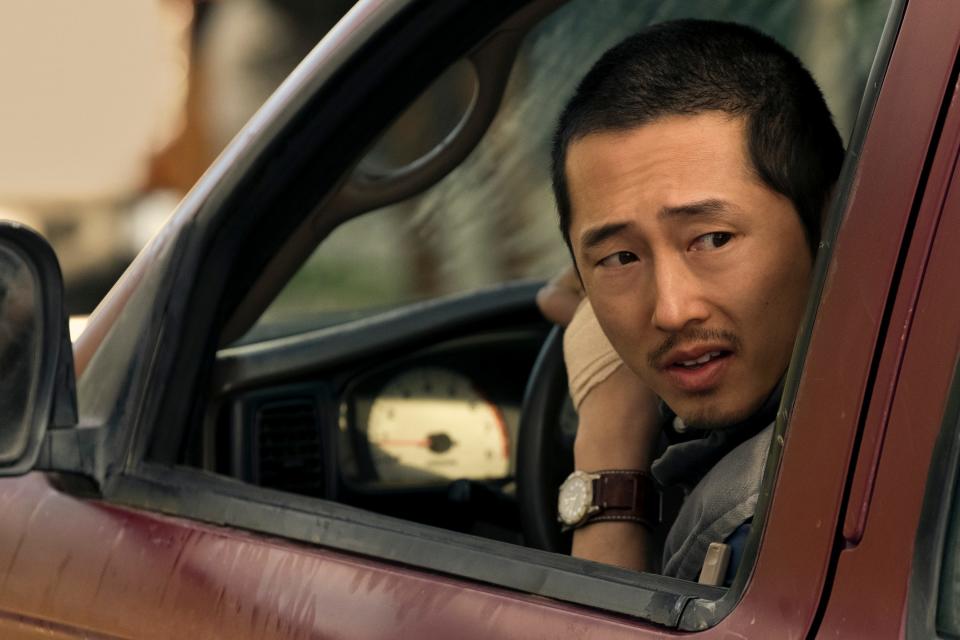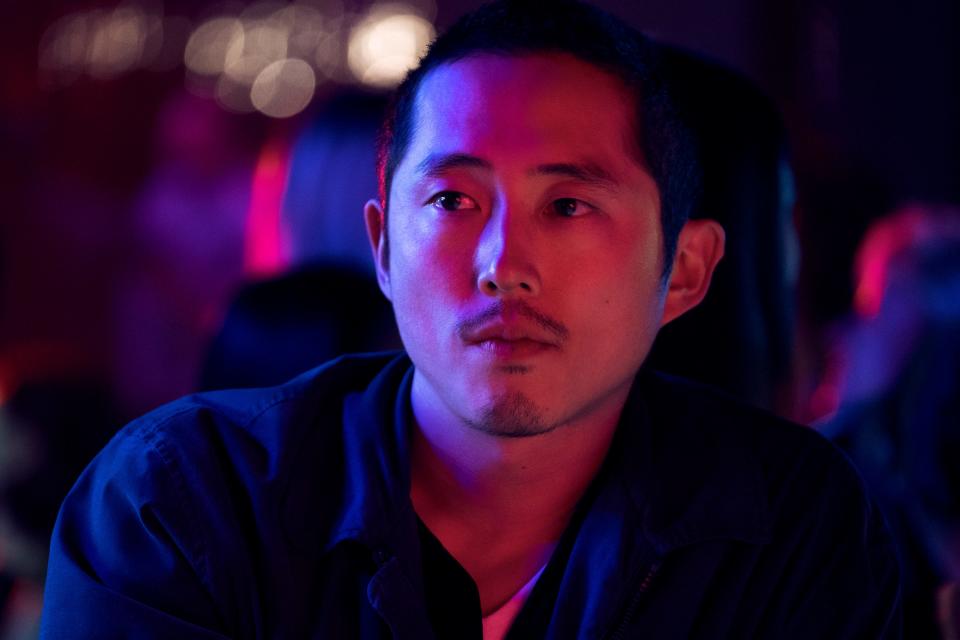Netflix's 'Beef,' driven by road rage, smartly portrays state of modern anger
- Oops!Something went wrong.Please try again later.
- Oops!Something went wrong.Please try again later.
- Oops!Something went wrong.Please try again later.
Everyone has done it. You hit the car horn and hold it for an ungodly amount of time, five seconds, 10, not to warn someone who's swerving into your lane or grab the attention of a friend spotted on the sidewalk, but to send the universal driving signal that you ... are ... .so ... angry you could scream (and you are screaming, only through a vehicular safety device).
That blaring sound spirals into a road rage incident between Steven Yeun and Ali Wong that launches a war of potential mutually assured destruction in Netflix's “Beef.” Long story short, this compulsively watchable 10-episode series is about anger in America — the raw, unreasonable sort of anger that leads otherwise law-abiding men and women to follow one another in their automobiles for reasons they might forgive if life wasn’t so unfair and difficult. And, honestly, who hasn't gotten mad over something minor recently, mostly because of fatigue over feeling like a punching bag for fate?

A dark comedy that taps into some painful drama, “Beef” often seems like another great moment in pop-culture fury. It deserves to join the pantheon of Howard Beale’s “I’m mad as hell and I’m not going to take this anymore!” speech in “Network," Colonel Jessup's “You can't handle the truth!” meltdown in “A Few Good Men” and any sketch from "Key & Peele" involving Luther, President Barack Obama’s anger translator. If only real life allowed for such epic indignation. Instead, most of us are stuck muttering the things we should have said after being trapped in yet another irritation situation.
The smart twist of “Beef,” created by Lee Sun Jin (who just came on board as a screenwriter of Marvel’s upcoming film “Thunderbolts”), is its revelation that its main adversaries have more in common than they think. Danny (played by Steven Yeun, who grew up in metro Detroit, the Midwest capital of aggressive driving, BTW), is struggling to survive financially and give his Korean parents a secure future. Amy (comedian-actress Ali Wong) is straining to close a multimillion-dollar deal that will end the constant pressure she is under to fund the upscale lifestyle of her artist husband and anxiety-riddled young daughter.
Danny and Amy's lifestyles are so different, they might as well be living on different planets instead of different parts of Los Angeles. But they are juggling similar stress levels, particularly in their efforts to pretend everything is fine to the outside world. Danny, a small-time contractor, tells the husband of an old girlfriend that he does a lot of charitable work when in reality he is desperate for customers. Amy, an entrepreneur, hides her desire to escape her all-consuming career from Jordan, the spoiled, culturally insensitive owner of a big-box chain (Maria Bello) who is considering buying Amy's upscale houseplant business.
More: 'The Power' offers intense depiction of women with electricity at their fingertips
More: WXYZ-TV meteorologist Kevin Jeanes leaving Detroit to join Chicago's NBC station
Behind their facades, Danny and Amy are both on the verge of burnout, physically and emotionally, and probably could relate to each other's troubles, if only they had met over a friendly beer instead of furiously in a parking lot
Yeun is amazing as Danny, who is pushed into panic and retaliation on a really bad day. It’s tremendous fun to see Yeun, who was beloved as heroic Glenn on "The Walking Dead" and earned an Oscar nomination for his portrayal of the reserved, resilient immigrant father in “Minari,” take on a character whose inner compass spins out of control. Despair makes Danny turn for help to his charismatic ex-con cousin Isaac (David Choe). Danny also has to deal with his brother Paul (Young Mazino), who avoids work with video games and cryptocurrency trading.
Wong is just as compelling as Amy, who must cope with her unflappable husband, George (Paul Lee), who advises her that “anger is just a transitory state of consciousness," and her disapproving mother-in-law (Patti Yasutake). When Amy is left steaming after Danny escalates their feud to a disgusting point, George's response is to calmly tell her: “You never know what someone’s going through in life.” Wong simultaneously conveys Amy's attempts to meet George's lofty expectations and her disdain for his endless supply of self-help tips.

By delving into the specifics and complexities of its mostly Asian American characters, "Beef" offers the sort of representation that is still too scarce on the American TV landscape. It also has the daring to accelerate its revenge-laden grudge match to speeds rarely attempted by today's dramedies. There is wonderful suspense in waiting to see just how far Danny and Amy will go — and how their decisions will entangle the other characters in ways that result in maximum complications.
But the secret of “Beef” is that it reads the room of 2023 America so well. What seems like class warfare between haves and have-nots isn’t that simple. Danny and Amy are both seeking a sense of safety that seems impossible in an age when stock markets can crash overnight, banks can fail for being too reckless and alternate currencies can collapse in a manner recalling the Dutch tulip bubble of the 1600s. Although Amy’s situation is much more comfortable than Danny's, both are ultimately at the mercy of billionaires like Jordan, who is so vastly affluent that she can toy with other people’s lives on a whim.

It’s easier to focus your ire on someone who cuts you off in traffic than it is to face the rampant uncertainties and inequities of these economic times and ponder how to fix things. At one point, someone tells Amy: “There is no objective truth. You create the truth that you want to inhabit.” This is what used to be called lying through your teeth. Now it’s viewed as good strategy. As “Beef” illustrates so well, the only thing we currently have to fear is truth itself.
Contact Detroit Free Press pop culture critic Julie Hinds at jhinds@freepress.com.
'Beef'
10-episode series arrives Thursday
Netflix
Rated TV-MA
This article originally appeared on Detroit Free Press: Steven Yeun's road rage is a driving force of Netflix's smart 'Beef'

